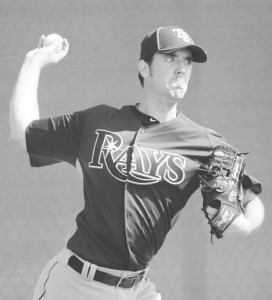A female acquaintance of mine once complained about baseball that “All it is, is a bunch of guys standing around grabbing themselves and spitting for an hour, moving for maybe two seconds, then standing around grabbing themselves and spitting for another hour.”
While this characteristic of baseball cannot be denied, there’s a lot more to a good baseball game. A good baseball book, however, needs to go beyond the technical, the wheels within wheels, the guessing and the strategy and the attempts by both teams to reduce chance to an absolute minimum and gain any edge in a game of inches. It needs to explore the characters that make up this oldest and most revered (deservedly or not) of American pastimes.
Dirk Hayhurst’s Out of My League is a good baseball book. Hayhurst, who pitched two seasons in the big leagues for the Padres and Blue Jays, spent most of his career in the minor leagues, and it is this experience that he writes about, exposing the sausage grinder that is Double- and Triple-A. Without varnish and with considerable humor, Hayhurst chronicles the juvenile pranks, macho posturing, Romanesque promiscuity and perversity, selfishness, physical and mental hardship, cruel hazing, abject poverty, and deep, abiding camaraderie that flourishes in the minors. Crappy hotels; brutal travel conditions; horrible food; callous managers; miniscule, indifferent crowds; treatment by ownership that compares unfavorably to medieval serfdom; minor leaguers endure all these, sometimes for their whole careers, for a chance to get to what they call with awestruck reverence ‘The Show.’
But Hayhurst isn’t just documenting minor league life. He is refracting it through his own experience in an attempt to draw a more universal conclusion about what can be gained and what must be sacrificed to a harsh daily grind that offers little hope for advancement and at best fleeting rewards.
For Hayhurst, life both within and outside the game is a tough slog. Even giving him the benefit of authorial doubt, it is hard to imagine that he doesn’t exaggerate a little bit in his portrayal of his reality-TV-level-dysfunctional family. Substance abuse, physical disability, denial, depression, and a grandmother who would make Lady Macbeth say “Damn, that woman is f***ed up” are what Hayhurst has to look forward to coming home to in the off-season, along with a meaningless, menial job at Circuit City. Only his girlfriend Bonnie, a saint in music therapist’s clothing, offers him any kind of respite.
Bonnie, too, tends to strain credibility. If women half as tolerant, understanding honest and faithful as Bonnie exist, then this is just one more yard in the steadily mounting Everest of evidence that I have been hanging around all the wrong bars and talking to all the wrong women. Still, I suppose she is possible, and she’s made more probable when she finally stands up to Hayhurst near the text’s conclusion, forcing him to look at what he has become and what he will lose if he keeps on the path he’s unconsciously chosen. In more ways than one, Bonnie is Hayhurst’s salvation.
Salvation is the operative word, because Hayhurst is one of those more religiously committed athletes. Thankfully, he doesn’t allow this to affect his prose, which is for the most part polished and fluid, and never sanctimonious. Short, episodic chapters bespeak the journalistic apprenticeship he underwent during his playing career, when he wrote a column for a sports periodical, and he can paint a word picture more than competently most of the time.
Compression, composite characters, and some rather extended direct quotations suggest that Hayhurst sacrifices some accuracy for the sake of making his point, but it doesn’t really matter in light of the larger project here: tracking Hayhurst’s evolution as a ballplayer and a man. The drama and tension of a life in the minors, where you balance your affection for your teammates against the knowledge that, in order for you to succeed, some of them must fail, make the monster he becomes seem almost inevitable, a man who gives everything to achieve a dream and comes close to losing everything of real value in his life just as that dream is within his grasp. What, the text implicitly asks, would you give up to reach your goal? What would you allow that goal to take from you? Out of My League is Dirk Hayhurst’s highly personal answer, and the book does not fail to redirect these questions back on the reader.
Books